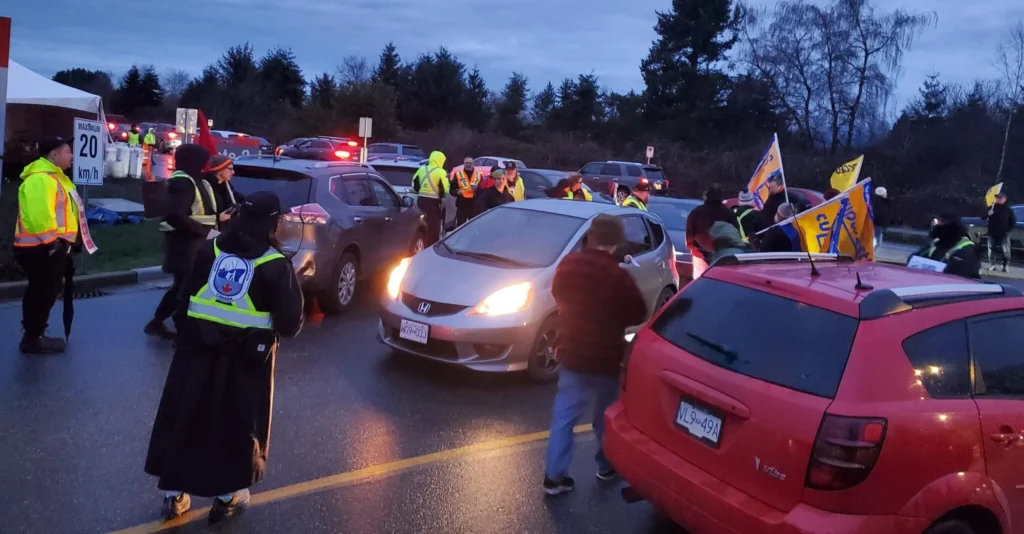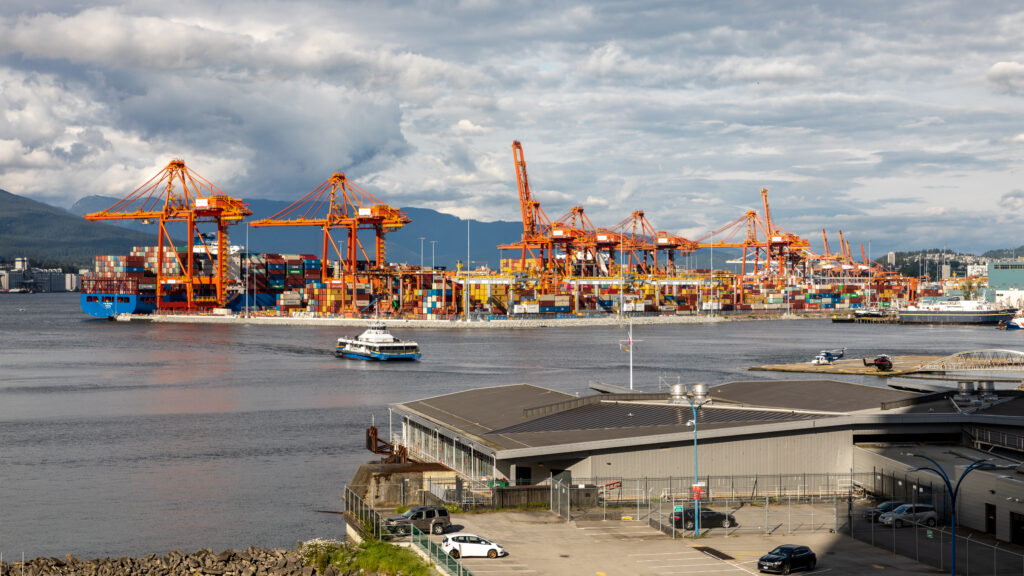In 2024, British Columbia felt the full force of a world in crisis, hungry for big changes. The year was marked by increased political polarization, with issues such as the right to strike, forest fires and the growing repression of the Palestine solidarity movement taking center stage in The North Star's reporting.
Strikes in key sectors of the economy, particularly transport and distribution, saw workers attempting not only to regain the economic ground lost in the last years, but also to regain their dignity and some protection from the chaos of capitalism. Meanwhile, employers and their political representatives in government responded by threatening, intimidating and ultimately legislating workers back to work.
Attacks on the Right to Strike
Canada Post
As Canada Post workers struck across the country, Local 846 in B.C.'s Lower Mainland took strong positions, exposing the federal government's responsibility for the mismanagement, hollowing out and privatization of the postal service.
At the start of the strike at Canada Post in November, the Crown corporation cut group health insurance coverage, forcing workers on long-term medical leave to pay out of pocket for expensive, often life-saving medications. In response, a group of workers tried to confront Burnaby Liberal MP, Terry Beech at his constituency office. He refused, and the workers were arrested.
While workers in the Greater Toronto Area protested against the back-to-work order issued in mid-December, in Vancouver, a community picket line was established at Canada Post's third-largest processing plant with the help of the ILWU and the East Van Worker's Assembly. The picket managed to delay the postal workers' return to work and allowed them to express their outrage at being forced back to work.

Transit
The right to strike was also under attack in the transit sector. The regional transit authority Translink applied to acquire essential service designation to squash the impending halt of service threatened by the B.C. transit supervisors' union. Translink operates the Coast Mountain Bus Company, West Coast Express, British Columbia Rapid Transit Company (BCRTC), and ProTrans.
With the essential services designation looming, Translink's shell game of multiple wholly owned and operated "subsidiaries" prevented workers from picketing Skytrain. In the end, supervisors and maintenance workers organized by CUPE 4500 ratified a new contract after a short strike.
Workers for the company HandyDart, an essential service which handles door-to-door transportation for seniors, disabled people and others with mobility challenges, went on strike in September. They demanded wage parity with other municipalities such as Fraser Valley, where workers won a significant wage bump after a 124-day strike.
In both instances, workers were forced to negotiate with the profit-seeking multinationals contracted to operate the service. Translink, the public agency responsible for providing transit services in the region, pretended to be a disinterested third party. Amalgamated Transit Union 1724, representing over 600 workers, reached a tentative agreement after 18 days of striking. Though service was significantly reduced during the strike, trips to essential medical appointments remained uninterrupted.
Ports
The year was marked by numerous labour struggles by port workers in B.C. and plenty of resistance from bosses.
In April, on the National Day of Mourning, the ILWU protested the lack of action against employers who put workers at risk of injury and death. They also protested the leaders of organizations like the Business Council of B.C. and the provincial government who protect them from receiving proportional justice.
ILWU President Rob Ashton told The North Star that 2024 would be the last time the union attends the event, being unwilling to stand “shoulder-to-shoulder with employers on April 28 anymore.” He emphasized the need to put employers in jail when workers are injured or die due to their negligence.

In October, the Grain Workers Union had a short four-day strike which was plagued by incorrect and misleading reports by mainstream media. These outlets disregarded workers' views and deferred to "expert" commentary that catastrophized the work stoppage, calling for further erosion of workers' strike rights to maintain business as usual.
In November, ports were made to run at full capacity again after B.C. port workers were ordered back to work along with those striking in Montreal and Quebec City. The back-to-work order followed a “defensive lockout” by the employer after the port foremen's union implemented a ban on overtime as a preliminary action. The employers refused to come to the bargaining table with concessions for the workers, especially on the main sticking point of automation.
In December, the freshly unionized fuel workers that supply YVR airport initiated a strike action. Only eleven workers run the fuel site, and the company claimed the strike would have little to no impact on airport operations, but workers told The North Star that the fuel supply is essential for daily operations.
The ongoing action also got a little boost of support by a “hot” edict issued by the BC Federation of Labour. This allowed auxiliary workers to refuse to handle goods which a company could use to alleviate the effects of the strike. The strike was also supported by off-site ILWU members to make up for the small number of employees who work at the fuel tanks.
World Events with Local Resonance
The genocide in Gaza and the fight for Palestinian freedom continued to motivate thousands to take to the streets in communities across B.C. Protests targeted Canadian corporations like Scotiabank who profit from Israel's war crimes. As the Canadian ruling class continued to march in lockstep with Israel, The North Star covered the crackdown on Palestine solidarity activists in B.C. This included the firing of a college instructor, arrest of a prominent solidarity activist and the designation of the well-established Palestinian prisoner support organization Samidoun as a terrorist group.
The North Star also covered a demonstration by members of B.C.'s large Filipino diaspora community who marked the 38th anniversary of the People Power revolution that toppled the Marcos dictatorship. This year's commemoration was particularly important, as Ferdinand Marcos's son, the current President of the Philippines, came under fire for human rights abuses in which Canadian mining companies are also implicated.

Wildland Forest Fires: Permanent Crisis and Ad-hoc Response
While not as devastating as the 2023 wildfire season (the worst on record in Canada), the 2024 season was still brutal, burning over a million hectares of forest, and resulting in 51 evacuation orders that covered 4,100 properties in rural B.C. The North Star spoke to wildland forest firefighter Joey Only the day that his home community of Wells, B.C. was put on evacuation order. He stressed that this type of intense wildfire season is likely here to stay, the product of a changing climate.
Another wildland forest firefighter interviewed by The North Star talked about the haphazard government response, the poor working conditions of the workers on the frontlines of crisis, and the need for a coherent public-sector response.
Polarized Provincial Politics
In what can only be seen as a repudiation, the NDP maintained the slimmest of majorities (47 of 93 seats, with 45% of the popular vote) in October's provincial election. The NDP barely beat out a Conservative Party who had only one sitting member and very little party infrastructure going into the election. The North Star's cartoonist Zol called out the two main parties who both stood for developer-friendly housing policies, increased police funding, and more punitive policies toward the poor people, the homeless, and drug users.
The election left the province almost perfectly split. On one side, the NDP in the urban and suburban centres, representing the interest of the real estate, financial and insurance sector. On the other, the Conservatives in rural and small-town B.C., representing resource industries keen to send more unprocessed wood, minerals and gas to the U.S. and Asia. There remains no political voice in B.C. for a sustainable, value-added, industrial economy that would benefit both urban and rural workers.


